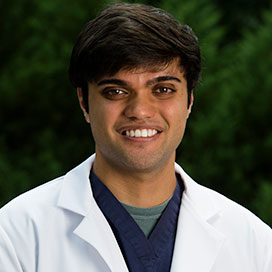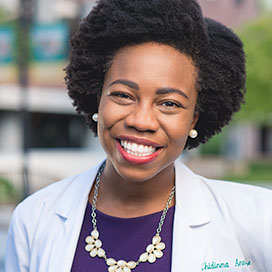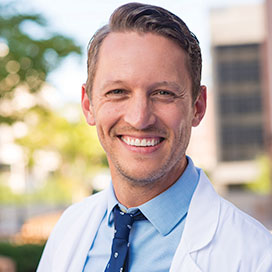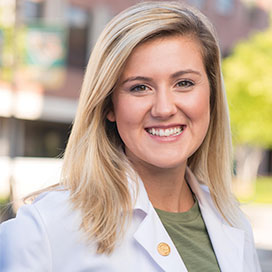Serving Locally and Globally
 This year third-year class president Salmaan Kamal became the second Finley Scholar.Third-year medical student Salmaan Kamal probably never imagined that his pre-med education would include helping coordinate the logistics of a goat delivery service. Raised in Tuscaloosa, where his parents practice medicine—his father is an endocrinologist and his mother a cardiologist—Kamal’s senior project at Princeton University took him to Sierra Leone, where he researched the accuracy of malaria diagnostic tests at a free clinic run by Wellbody Alliance. The experience included helping Wellbody establish a goat farming initiative, by transporting live goats to farmers via motorcycle.
This year third-year class president Salmaan Kamal became the second Finley Scholar.Third-year medical student Salmaan Kamal probably never imagined that his pre-med education would include helping coordinate the logistics of a goat delivery service. Raised in Tuscaloosa, where his parents practice medicine—his father is an endocrinologist and his mother a cardiologist—Kamal’s senior project at Princeton University took him to Sierra Leone, where he researched the accuracy of malaria diagnostic tests at a free clinic run by Wellbody Alliance. The experience included helping Wellbody establish a goat farming initiative, by transporting live goats to farmers via motorcycle.
Kamal was selected as the 2016 recipient of the Sara Crews Finley, M.D., Endowed Leadership Scholarship. The scholarship, which was established by Dr. Finley’s family to support students who demonstrate exceptional academic and leadership abilities, honors the legacy of pioneer in medical genetics and a beloved faculty member and student mentor. “It is humbling to be recognized as someone with the integrity to carry out that legacy of service,” Kamal says.
After starting medical school, Kamal began volunteering with Equal Access Birmingham, the medical-student-run free clinic for underserved patients. “One of the first things I did was survey our patients about their primary care experiences with the help of Dr. Stefan Kertesz,” he says. “By listening to patients and to our leadership, we improved our current operations and also implemented a weekly acute care clinic, reinvigorated our health education efforts, and created a novel partnership with the school to allow students to earn class credit while volunteering at EAB. My time there was the perfect combination of clinical care, program implementation, and advocacy.”
Kamal is already working on a scholarly research project with a focus that grew from his work at EAB. “I’m working with Dr. Kertesz and Dr. Karen Cropsey to develop a better way to distribute naloxone kits to uninsured and homeless patients at risk of opioid and heroin overdoses. We are looking at how to connect with those who need this intervention—identifying the intersections and even soup kitchens where they may gather—and then how to get them to overcome their fear of prosecution so they’ll actually complete the paperwork needed for the kits.”
A Mission to Improve Cancer Care
This summer, Chidinma Anakwenze returned to UAB after putting her medical school training on hold to earn a Master of Public Health degree from Johns Hopkins Bloomberg School. The fourth-year medical student and Florence native says her interest in public health was sparked the summer between her first and second years of medical school, when she traveled to western Jamaica to conduct a breast and cervical cancer educational intervention project. An opportunity to conduct research with the UAB Department of Radiation Oncology in her third year of medical school further spurred her interest.
 Chidinma Anakwenze recently returned to UAB after earning an MPH from Johns Hopkins Bloomberg School. “I was running my own statistical analysis but I didn’t have a deep understanding,” she says. “So I had that desire to bolster my statistical skills as well as learn more about epidemiology and research. I thought to be better able to serve the underserved in terms of cancer care it would be a good idea to get the formal education needed to do large-scale population level interventions in the future. That’s when I started thinking about getting my MPH.”
Chidinma Anakwenze recently returned to UAB after earning an MPH from Johns Hopkins Bloomberg School. “I was running my own statistical analysis but I didn’t have a deep understanding,” she says. “So I had that desire to bolster my statistical skills as well as learn more about epidemiology and research. I thought to be better able to serve the underserved in terms of cancer care it would be a good idea to get the formal education needed to do large-scale population level interventions in the future. That’s when I started thinking about getting my MPH.”
While at Johns Hopkins, Anakwenze designed and conducted a project that took her to Nigeria, where she was born. “I left Nigeria when I was five, so I was drawn to do a project in Nigeria related to radiation oncology access. I went there this January and talked to patients and staff at a teaching hospital about some of the challenges they face with delivering and receiving treatment. I learned the need is actually greatly underestimated. Most of the patients that I saw were being referred from outside hospitals only to discover that the machine to treat their cancer was not working.”
This year, Anakwenze was awarded the Comer Foundation Medical Scholarship and the Benjamin and Roberta Russell Endowed Medical Scholarship. She says being away from the School of Medicine has made her even more grateful for the scholarship support she has received here, and the opportunities it opens up for her. “When I was at Hopkins I had a half-tuition scholarship and I spent a lot of my time working,” she says. “It’s really hard to balance work with research and academics, so having the scholarship at UAB is tremendously helpful for me to be able to focus on learning and my research.”
Renaissance Man
When second-year medical student Russell Marsh says he has “broad interests,” that’s an understatement. The Pelham native came to UAB as an undergraduate intending to study biology but graduated with a B.A. in Spanish in 1999, and then went to work in the IT field. After working in IT for several years, he quit his job to be a stay-at-home dad to his growing family and to attend graduate school. “Originally I thought I would get an MBA, but I ended up doing the English graduate program at UAB instead and had a wonderful time,” he says.
 Since he is a father of four, Russell Marsh faces challenges few of his fellow medical students confront.Marsh earned a master’s degree in English in 2009 and continued raising his children full-time before deciding to pursue another long-time interest. He says he always had “an inkling” to study medicine and now, “I was in a place in my life where applying to medical school felt like the right thing to do. I took a year to take some of the hard sciences that I needed, and all that time I gave myself the option to back out if it didn’t feel like the right path. But everything just came together. I felt like this series of events sort of laid itself out in front of me to let me know that this was the right decision.”
Since he is a father of four, Russell Marsh faces challenges few of his fellow medical students confront.Marsh earned a master’s degree in English in 2009 and continued raising his children full-time before deciding to pursue another long-time interest. He says he always had “an inkling” to study medicine and now, “I was in a place in my life where applying to medical school felt like the right thing to do. I took a year to take some of the hard sciences that I needed, and all that time I gave myself the option to back out if it didn’t feel like the right path. But everything just came together. I felt like this series of events sort of laid itself out in front of me to let me know that this was the right decision.”
But the decision to go to medical school wasn’t his alone to make. Marsh says he and his wife Jessica discussed it for a year before he applied. They were especially concerned about the impact it would have on their four children—Marissa (21), Emily (17), Chloe (11), and Pierce (9). “We talked about it in terms of scheduling and everybody having to pitch in,” he says. “The kids had to understand that I would go from being dad 24/7 to basically being dad for soccer games and concerts and stuff. It’s been harder on the younger ones, obviously. At first they wanted me to go back to being dad all the time, but we just kept reinforcing that it’s a short-term sacrifice for a long-term gain.”
This year, Marsh was awarded the Dean’s Primary Care Scholarship, the Drs. Santosh and Prakesh Kansal Endowed Medical Scholarship, and the Clarence E. and Margaret S. Klapper Endowed Scholarship in Medicine. He says he feels drawn to primary care, especially family medicine, because, unsurprisingly, “I’d like to be able to see a lot of different types of cases. I think it suits my personality well—it allows me to be involved with people’s lives.”
Bringing Health Care Back Home
According to third-year medical student Palee Myrex, her hometown of Brushy Pond, near Smith Lake in Cullman County, is so small, “if you blink you’ll miss it.” She says, as a child, she and her nine cousins spent summers on their grandfather’s farm, swimming in a swimming hole and camping in the woods on the property. It was the lack of diversions in the area that caused her to discover her first true love—sports. “I played basketball and ran cross-country all through high school,” she says. “Really, the only thing on my radar about college was where I could continue running. I ended up signing with the University of Alabama to run cross country.”
One day during her junior year at Alabama, Myrex saw a flyer for the Huntsville Rural Pre-Medical Internship. This School of Medicine program provides in-depth experiences for undergraduates who are interested in attending medical school to become family physicians in rural areas of the state. She decided to apply and completed the program the summer before her senior year of college. “Before that, I honestly didn’t think I could be a doctor – that’s not what people from my town do,” she says. “But the program was amazing—we got to shadow different physicians in the hospital and in private practice, and I just fell in love and knew that this is what I want to do for the rest of my life.”
 Palee Myrex hopes to return to her small hometown of Brushy Pond to practice medicine when she completes medical school.Her timing was fortuitous. A stress fracture in her hip meant she would have to sit out her senior year of cross-country, and Myrex says she was at a low point and in search of a new goal. She studied for the MCAT, went on interviews, and was accepted to UAB, which she says was her first choice of medical school. This year, she received the Dean’s Primary Care Scholarship and the newly established Charles E. Ingalls, M.D., Medical Scholarship. She started her third year of medical school at the Montgomery Regional Medical Campus this August and received the Dean’s Primary Care Scholarship and the Charles E. Ingalls, M.D., Medical Scholarship. “I’m an active person so I was happy to finally get out of the classroom,” she says. “I’m on my surgery rotation now and it’s been a blast, actually getting to pull chest tubes and help put in PEG tubes and learn to suture.”
Palee Myrex hopes to return to her small hometown of Brushy Pond to practice medicine when she completes medical school.Her timing was fortuitous. A stress fracture in her hip meant she would have to sit out her senior year of cross-country, and Myrex says she was at a low point and in search of a new goal. She studied for the MCAT, went on interviews, and was accepted to UAB, which she says was her first choice of medical school. This year, she received the Dean’s Primary Care Scholarship and the newly established Charles E. Ingalls, M.D., Medical Scholarship. She started her third year of medical school at the Montgomery Regional Medical Campus this August and received the Dean’s Primary Care Scholarship and the Charles E. Ingalls, M.D., Medical Scholarship. “I’m an active person so I was happy to finally get out of the classroom,” she says. “I’m on my surgery rotation now and it’s been a blast, actually getting to pull chest tubes and help put in PEG tubes and learn to suture.”
Myrex says that the experience of the Huntsville Rural Pre-Medical Internship stays with her, and as a result she is leaning toward family medicine. “I ultimately want to go back to Brushy Pond and open up a clinic there, and I feel like family medicine would be best for that,” she says. “Most people who need a doctor go to Cullman or Jasper, which are both about 30 minutes away. I feel like I could give back to this community that I absolutely love and that gave so much to me.
“Also, I just like the slower pace. I lived in Tuscaloosa for four years and in Birmingham for two and now I’m in Montgomery, and these cities are all too big for me. I’m ready to go back. It doesn’t even get dark here because there’s so many street lights; back home you can always see the stars.”
By Jane Longshore